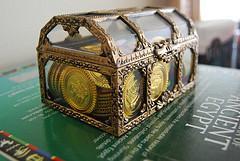
Photo by Chrissy H.
This story with Jewish roots is part of a series about elder tales.In an elder tale, an older adult serves as the protagonist of the story rather than a minor character.
As such, he or she shows growth, strength of character or personal development.
Elder tales give older adults the focus or the "starring roles," making these characters more rich, complex and nuanced.
This contrasts with the flat, stock characters of older people in other tales that promote stereotypes (negative or positive) of aging. All generations of people can benefit from seeing elderhood in more complex ways.
The source for this tale comes from Allan B. Chinen's collection In the Ever After: Fairy Tales and the Second Half of Life. Willmette, IL: Chiron Publications, 1989. Chinen cites his source as G. Friedlander's The Jewish Fairy Book. New York: Stokes, 1920. I could not find a separate source for this tale.
Here is my retelling of "The Wise Merchant":
Once upon a time, an older merchant and his grown son set out on a journey to sell a lifetime of wealth that the father had accumulated in the form of jewels. They placed the jewels in a chest and told no one about these valuables or the true purpose for their trip.

Photo by VAnatolia.
Father and son secured passage on a ship headed to a large town where they could find a buyer to give them a good price for the jewels.As they sailed on the ship, the older man and his son overheard the sailors on the deck whispering to each other about the chest.
From hearing snippets of the sailors' conversation, the older man and his son began to realize that their lives where in danger.
The younger man said, "Father, we should fight these greedy men to save the jewels--and our lives." The older man responded, "No, we are outnumbered. These pirates will overpower us."
The merchant and his son returned to their cabin to check on the chest. The older man paced back and forth the small distance of their cabin as his son sat on the chest with his head in his hands.

Photo by als3N.
A short time later, the sailors on deck turned to see the older man pushed open the doors to the deck, dragging the chest and yelling back to his son, "You are such a worthless son. You never listen to anything I say."The son appeared at the doorway and yelled out to his father, "Why should I listen? You never have anything of value to say. You are an old fool!"
The older man moved with intent to the side of the ship and hoisted the heavy chest to the railing.
With such a spectacle unfolding before them, the pirates were stunned into silence. The merchant then opened the chest for all to see the abundance of jewels inside.
The son was still standing in the doorway as the father yelled back to him, "There's no way I'm going to bestow my wealth to you! I'd rather live in poverty than allow you any portion of my life's work to you!"
And before anyone could stop him, the old merchant pushed the chest and its contents into the sea.
Once the older man and his son returned to their cabin, the younger man said, "I see that your plan was better than mine. The greedy sailors will leave us in peace now."

Photo by Levi.
Once the ship docked at their destination, the merchant quickly guided his son to the local magistrate's office where they filed charges of piracy and conspiracy to murder against the greedy sailors.Once arrested, the sailors were asked by the judge, "Did this man really throw a chest filled with jewels overboard." The sailors attested to that incredible action.
The judge replied, "Well, no man would do something that foolish unless he feared for his life."
The greedy sailors saw that they were headed for jail or worse so they struck a bargain with the judge. "If we give this man and his son wealth equal to the lost jewels, will you overturn the charges?" And the judge agreed.
Things to think about
I love how the father found a way to solve this problem with brains when the son's first impulse was to use brawn. The older man's treasure wasn't so much conveyed in the jewels he possessed, but in the lifetime of hard-won wisdom that he accumulated.
The wise merchant was able to correctly read the situation, assess his options, and use what he know about human nature to save his life and save his son's life.
The story could have ended there. However, the merchant also knew that he could persuade a judge to find evidence enough to arrest the greedy sailors who then restored the man's wealth.
The wealth, of course, serves as a metaphor.
People can have the benefits of age that are more intangible than jewels but powerful nonetheless. Older adults can negotiate through difficult situations using their wisdom. And they can bestow insights to the rising generation in ways that keep younger people from harm in the present and that enriches their future by inheriting their elders' wisdom.
By modeling wise and mature behavior, older adults teach their grown children (and grandchildren) how to survive and thrive in a future where the most mature members of society will not always be physically present.
What is the single most profound insight of this elder tale for me? It's acknowledging that pirates cannot steal and the sea cannot swallow the wisdom that older adults have to offer us. Now it's up to us to look to the generation above us--even if that generation above you has passed on. If we show our children and grandchildren how we look up to our own elders, we increase the probability that they will inherent our wisdom.
Related
The Magic Forest: An Elder Tale from Croatia
Kitchen Wisdom: An Elder Tale from Japan
The Old Alchemist: An Elder Tale from Burma

